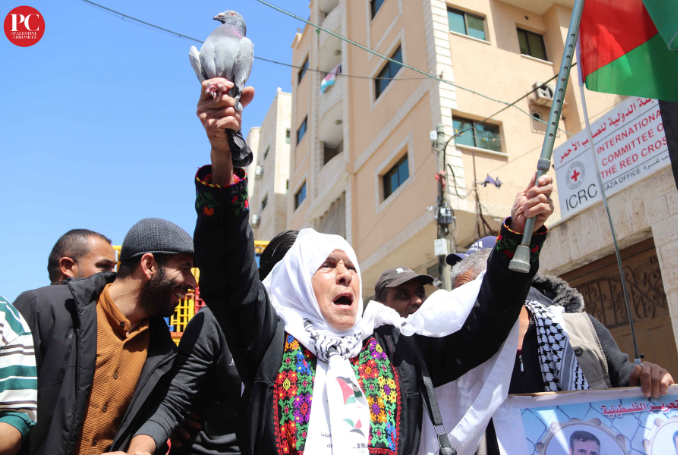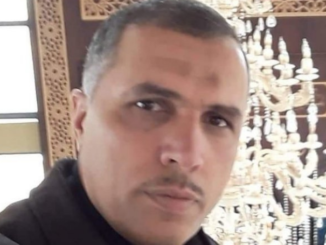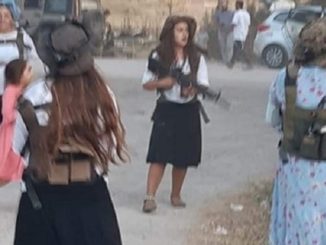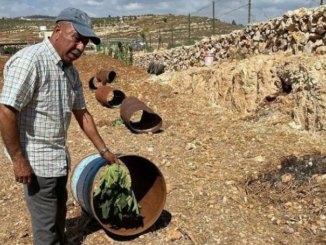
By Benay Blend
According to Samidoun, there are over 1,100 Palestinians currently incarcerated without charge or trial, nearly one-fourth of all Palestinian prisoners.
On August 17, 2023, at least 75 Palestinian prisoners in all prisons declared that they would begin a hunger strike at 7 p.m. to challenge recent assaults from the jailers. Specifically, their action is in response to forces that invaded the Naqab desert prison the previous day.
In the morning hours, Israeli forces raided sections 3 and 4 of the prison, attacking prisoners, ransacking their rooms, and moving them to Nafha prison. Detainees were already suffering from intolerable conditions due to an extreme heat wave.
These assaults are the latest in a series of assaults at the hands of “Minister of National Security” Itamar Ben Gvir, who had earlier visited the prisons to check on the implementation of his plans to further strip prisoners of their rights.
Accordingly, the Higher Emergency Committee of the Palestinian Prisoners’ Movement issued a commitment to the resistance within the prisons. “We are still on the front lines,” the statement reads, “and we will teach this enemy another lesson in resistance, confrontation, and unity if it continues its aggression.”
Coincidentally, this escalation of Palestinian prisoner resistance comes within the month of Black August, an African (Black) institution dedicated to what Hood Communist editor Erica Ryan calls “a liberation movement [that] emerged from a space of captivity,” specifically, the 1970 uprising in a Marin Country, California courthouse to free political prisoner George Jackson from incarceration.
The state-sponsored assassination of Jackson in August 1971 further flagged Black August as a time to honor all freedom fighters who were murdered for their part in the resistance. Since then, Black August has evolved into a larger statement encompassing the damage that mass incarceration has inflicted within Black and other oppressed communities.
As Basil Farrag notes, the Zionist regime justifies administrative detention as important for “security” reasons, but in practice, it ignores limits set by international humanitarian law and human rights law. Like in African (Black) communities, where “mass incarceration is a perfect reflection of how the capitalist system moves to systemically repress entire segments of the population,” the Zionist state uses its power to hinder Palestinian resistance, impart fear among the colonized population, and inflict harm on Palestinian detainees and their families.
More importantly, states Farrag, “Israel’s use of administrative detention is a form of psychological warfare.” Detainees and their families are kept in a “perpetual state of uncertainty,” partly because administrative detention orders can be renewed indefinitely so subjects never know when they will be released.
“Palestinians from the river to the sea live in a reality in which they do not know when, why, or for how long they might be imprisoned,” Farrag continues, thus all Palestinians are affected by this practice. This psychological violence constitutes the lived reality that the colonized live with daily, along with the knowledge that prisoners are subjected to intolerable conditions inside the prison walls.
For example, at the beginning of this protest in early August, the Zionist prison administration in Megiddo prison imposed collective punishment on the Popular Front for the Liberation of Palestine (PFLP), including the banning of family visits, confiscating of electrical appliances (including electric fans used during the intense summer heat), and locking down the sections of PFLP prisoners to stop them from attending recreation or the halls.
As for prisoners transferred to Nafha prison on August 8, many were prevented from bringing their clothing and personal belongings. As Samidoun: Palestinian Prisoner Solidarity Network explains, the practice of frequent and mass transfers is used to “destabilize the prisoners’ lives and deny them the opportunity to organize and confront the occupation.”
According to Samidoun, there are over 1,100 Palestinians currently incarcerated without charge or trial, nearly one-fourth of all Palestinian prisoners. Administrative detentions orders are “indefinitely renewable” and Palestinians are often held for years without charge, trial, or evidence, due to a “secret file.” This is the highest number of administrative detainees imprisoned at one time in approximately 20 years.
Despite repressive measures, political education remains an integral part of the struggle, both inside and outside of prison walls. To commemorate Black August, African (Black) organizations, specifically Black Alliance for Peace and Hood Communist, issue study guides that recuperate the past in order to organize for the future.
For example, in “Black August: Fight, Study, Fast, Train,” Hood Communist staff writers explain the history of Black August, but suggest using it to study the condition of political prisoners currently held behind prison bars.
In the Foreword to These Chains Will Be Broken: Palestinian Stories of Struggle and Defiance in Israeli Prisons, Khalida Jarrar, member of the PFLP who was held in administrative detention several times, writes that “prison is the art of exploring possibilities; it is a school that trains you to solve daily challenges using the simplest and most creative means” (p. xviii), in other words, the highest form of political education in that it involves collective struggle and sumoud (steadfastness.)
The hunger strike is a nonviolent strategy that should gain the support of activists who propose that Palestinians adhere to nonviolence in their struggle against the Zionist state. Unfortunately, this stance on the part of internationals has several inherent flaws, including the way that it glosses over violence directed towards the colonized by the state.
As Ramzy Baroud explains, the “non-violence bandwagon” ignores the “reality on the ground.” Moreover, he concludes: “Only the unique experience of the Palestinian people and their genuine struggle for freedom could yield what Palestinians as a collective deem appropriate for their own.”
Several years ago, Hood Communist asked its readers: “How is it that many of us are so willing to engage revolutionary ideas but dismiss the revolutionaries who pushed those ideas into praxis?” It concluded that “Black August cements that question as not only important but critical in how we come to understand our collective liberation.”
As Palestinian prisoners continue their hunger strike during the month of Black August, that question is still relevant today. Accordingly, in their message to the opposition, the Higher Emergency Committee of the Palestinian Prisoners’ Movement declared their unified opposition: “We emphasize that in all national and Islamic action factions, we are united in one trench, as one fist, against the aggression. We will shatter the illusions of the occupier before our unity once again.”
“It is essential that we understand Black August as not just a time of personal reflection and discipline,” writes Hood Communist, “but also a time to uplift that legacy of independent revolutionary African struggle.” The importance of collective action exists outside of prison as well as within its walls.
Consequently, Palestinians from all political factions and resistance movements declared their unified support for all forms of prisoners’ resistance. Following the attack on the prisoners, the resistance in Gaza carried out a missile test, firing 50 rounds over the sea in a missive for the occupation.
Samidoun, along with other organizations, including the PLO Commission for Detainees and Ex-Detainees Affairs, called on internationals to support the prisoners’ movement at this time.

– Benay Blend earned her doctorate in American Studies from the University of New Mexico. Her scholarly works include Douglas Vakoch and Sam Mickey, Eds. (2017), “’Neither Homeland Nor Exile are Words’: ‘Situated Knowledge’ in the Works of Palestinian and Native American Writers”. She contributed this article to The Palestine Chronicle.







